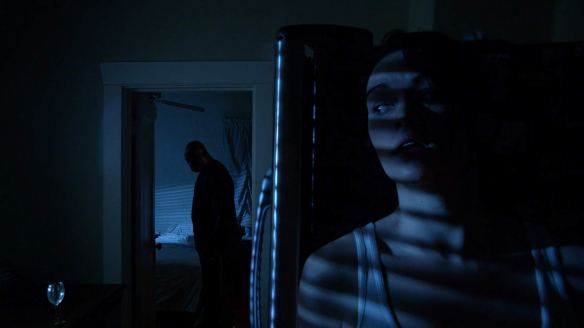(2018) Sex Thriller (Artsploitation) Brenna Otts, Luke Sorge, Jazz Copeland, Gena Shaw, Reggie De Morton, Michael Vasicek, G. C. Clark, Kevin Sean Ryan, Iva Nora, Meagan Kiefel, Steve Van Beckum (narrator), Joseph M. Veals, Ashley Gagnon. Directed by Drew Barnhardt
Not many who are reading this will remember the golden era of grindhouse films. Those were the days when movies that were full of graphic violence, plenty of (female) nudity and lots of sex. But the 70s came and went and gradually those types of films fell out of favor. However, they influenced dozens of modern directors, not the least of whom are Quentin Tarantino and Robert Rodriguez.
Rondo director Drew Barnhardt is evidently another one so influenced. His latest would feel right at home in Times Square circa 1977. It’s got elements of slasher films, black comedies, psychological thrillers, a revenge epic and even grindhouse porn.
Paul (Sorge) is recently returned from Afghanistan and like many veterans, has returned with a case of severe PTSD. To cope, he has turned to self-medicating with alcohol. He’s hit rock bottom, losing his job and his apartment. Reduced to sleeping on his sister Jill’s (Otts) couch, she finally confronts him after catching him drinking – and sends him to a therapist named Cassie Wright (Shaw) whom she recently met.
With nothing left to lose, he heads to Cassie’s office where she basically tells him that the key to beating his addictions is simply to get laid. She gives him an address to go to for a kinky party, and the password for entry: Rondo. After some soul searching, he decides to go. There he enters a miasma of sex and murder, one that will drag his sister and father (Vasicek) into the middle of.
Like many grindhouse films of that era, Rondo doesn’t have much of a budget. The effects are practical albeit some occasionally over the top – whoever planted the squibs for the final confrontation had a field day. Therefore, a film like this has to rely on a decent plot – which it has. It also has to rely on decent performances and there we get a little bit dicey as the acting tends to be stiff, perhaps by design. It also has to rely on graphic sex and violence – and the film gets full marks for that. Barnhardt is obviously not afraid to push the envelope on that score.
The dialogue is fairly noir and has a few gems in it, such as “If you’re gonna live in the swamp, you’d better make friends with the gators.” There is voiceover narration which is done in kind of a “tough guy” noir tone. Unfortunately, the tone is a bit off; the voiceover narration in the cult TV show Pushing Daisies utilizes a stuffy British tone and it works as comedy, but the narration here ends up being annoying and that wouldn’t necessarily be a bad thing but it’s inconsistent; at times during the movie every little event is commented on but then long stretches go by without any narration.
The soundtrack is pretty nifty, retaining elements of the ‘70s, ‘80s and ‘90s and working really well in enhancing the action. Speaking of action, the denouement featuring a beautiful woman in bra and panties wielding a machine gun which has to be the wet dream of an NRA card carrier, and works as black comedy here. In fact, there are sly comic overtones throughout although sometimes you kind of have to look for them.
Fans of exploitation films will get a kick out of this one. Fans of the directors who utilize those influences in their work may also find this entertaining. However, if you find those sorts of films distasteful, this really isn’t the movie for you.
REASONS TO SEE: Catchy dialogue and nifty score.
REASONS TO AVOID: Some of the performances were on the wooden side.
FAMILY VALUES: There is profanity, graphic violence, gore, graphic nudity, graphic sex – pretty much graphic everything.
TRIVIAL PURSUIT: Most of the film was shot in the Washington Park and LoDo districts in Denver.
BEYOND THE THEATER: Amazon, Google Play, iTunes, Vudu
CRITICAL MASS: As of 7/21/19: Rotten Tomatoes: No score yet: Metacritic: No score yet.
COMPARISON SHOPPING: Eyes Wide Shut
FINAL RATING: 6/10
NEXT: Apostle








